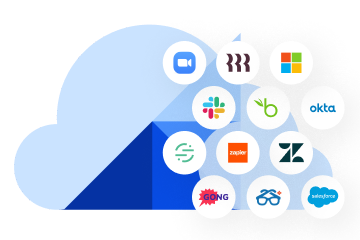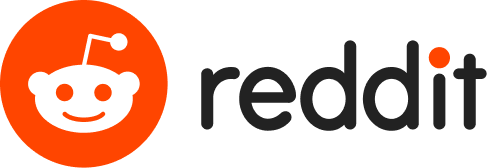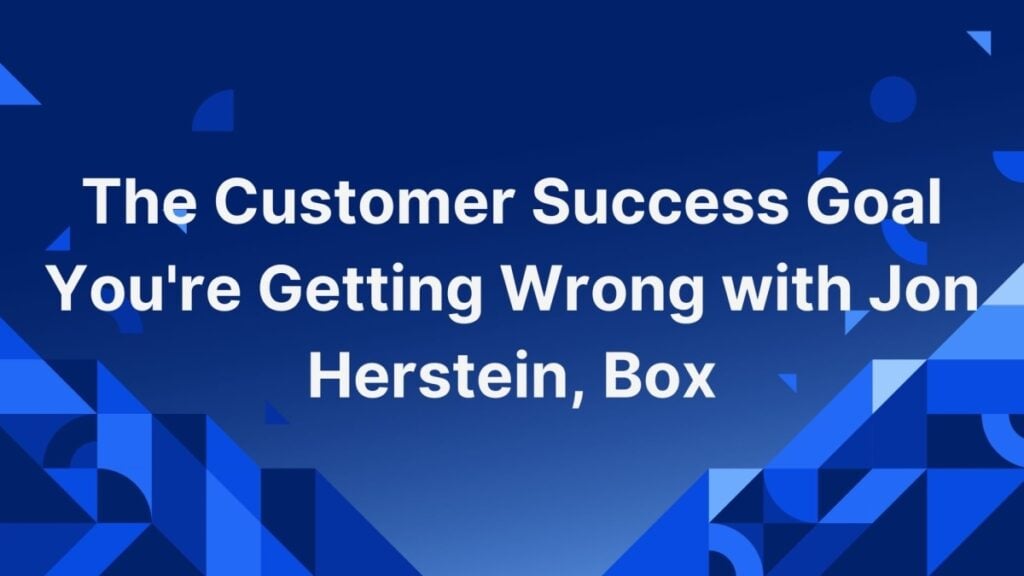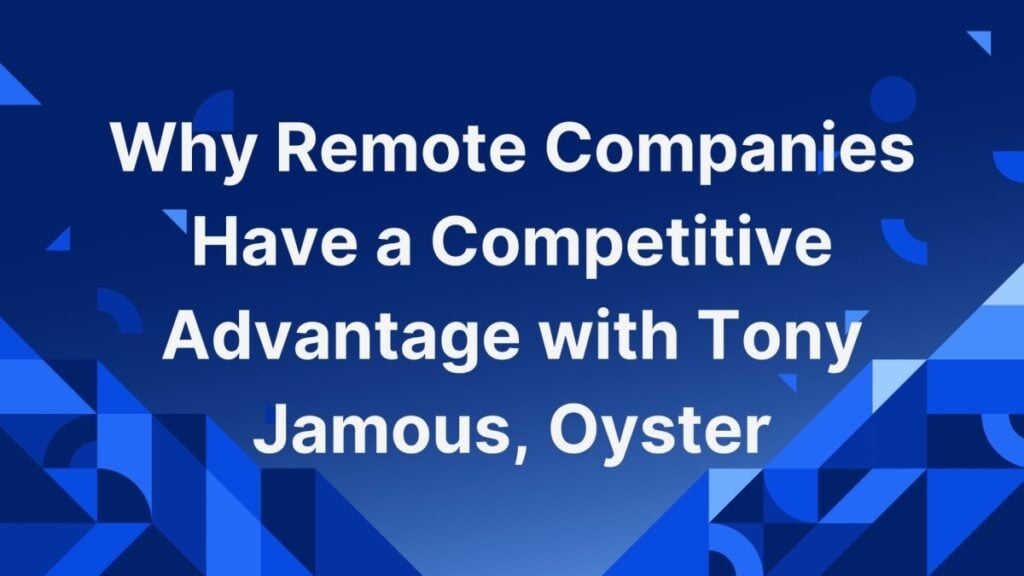-
 Resource Center
Resource Center
Discover enablement best practices and more in our resource center.
-
 Blog
Blog
Read the latest on enablement, learning and training trends.
-
 Podcast
Podcast
LEARN from the top leaders in SaaS.
-
 Videos
Videos
Watch videos and gain actionable insights from leading experts.
Unlocking Sales Success Through Trust and Culture with Lindsey Scrase, Checkr
No matter your industry, you’re in the people business. So how do you win friends and influence your people - by building trust?
“I believe so deeply that when you truly build trust, you have a much better and more high-functioning team, and you're going to get the best out of your people. You can't force someone to give you their best. They have to choose to really go that extra mile,” says Lindsey Scrase, CRO of Checkr.
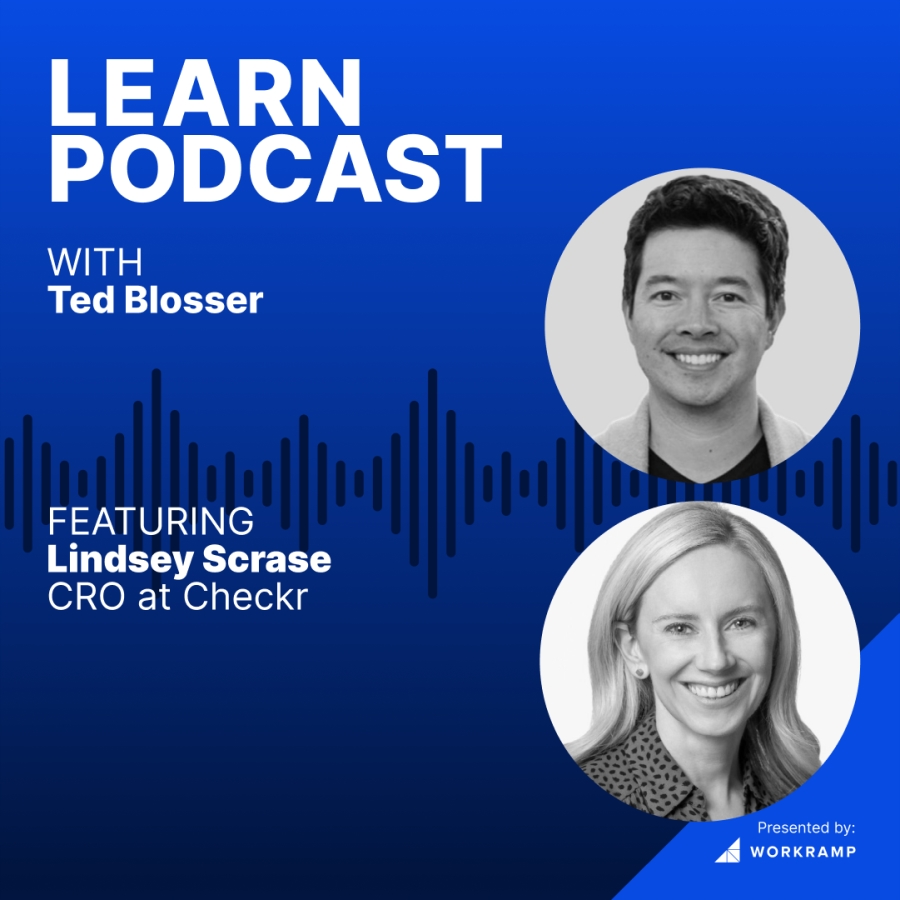
In our latest episode of LEARN, Lindsey Scrase chats with Ted to talk about her experience joining a late-stage startup and balancing the past with her present and future goals for the team. Additionally, they talk about Lindsey’s four factors of culture that can help you enrich your own.
In this episode, you will gain insights into:
- Developing culture effectively with four essential factors
- Adopting an aggressively data-driven approach to increasing sales and revenue
- Enabling sales and staying aligned with the team
Tune in to discover how you can cultivate your business culture that moves you closer to your milestones.
Timestamps
04:01 - Four elements of culture
07:01 - Joining a late-stage company
09:01 - Implementing new strategies as a CRO
11:05 - Data-driven sales
13:42 - Staying aligned as a team
18:55 - Engagement point sweet spots
20:03 - Rapid-fire round
Resources
Podcast Recommendation:
Transcript
Lindsey: I believe so deeply that when you truly build trust, and there's a lot of ways to do this. You have a much better and more high-functioning team, and you're going to get the best out of your people you can't force someone to give you their best.
They have to choose to really go that extra mile. On that point, like for me, it starts at the top and with the leadership team. And there's a lot I do intentionally to invest in that.
I really encourage people to share, not just about work, but you as a whole human, like what is happening, and those kinds of things just bring people together, and they get everyone on the same page on the same team.
They just build that unity.
Ted: Hi, I'm Ted Blosser, CEO and co-founder of WorkRamp, where we're redefining the corporate learning space with the world's first all-in-one learning cloud for employee and customer learning. Welcome to the Learn Podcast, where we learn from the biggest leaders in SaaS and hear what makes them successful.
Hope you enjoy the show.
Hey everyone, welcome back to the LEARN podcast. We have an amazing guest on here today. We have Lindsey Scrase, CRO at Checkr. Thanks for coming on, Lindsey.
Lindsey: Thank you for having me. So good to be here and to meet you.
Ted: before we get into it, Can you give us your elevator pitch on you on Checkr and maybe a little bit on your background as well, too?
Lindsey: I'm the chief revenue officer at Checkr. As you mentioned, Checkr is a Series E HR tech company that has really been focusing on disrupting the background check industry, which brings tech-forward into, taking an API-first approach to this. Our founders started it; they were working at a gig company which required like ramping and hiring of folks and realizing there was no easy way to do this quickly and in a data-driven way. And they're going to disrupt it with technology. we're also really mission-driven. So focusing on the candidate fairness and the candidate experience, with a real mission on advancing hiring of those who have been justice impacted.
And there are millions and millions of people who want to work. But I've been kept out of the workforce because they have some sort of criminal record. As CRO, I oversee all of our customer-facing teams. So sales, marketing, CS, operations, customer support. And I'm almost a year in, and I'm absolutely loving it.
It's an incredible company. Before Checkr, I was at Google Cloud for 10 years. So I joined when it was a small department side hustle startup within Google. And we were selling essentially Gmail to businesses like a piece of hardware for internal search. and then I left when it was over 20 billion run rate.
I built a lot of teams when I was there. and then ultimately was running our revenue globally for G suite, or Google Workspaces is now called, as well as Google Cloud Platform for our SMB and our mid-market businesses. On top of that, I'm a mom of two kids. That's my other full-time job.
Ted: Amazing. The size of Google and that scale is just so massive. When you're talking billions and here in startup land, we're talking in the millions, what was the biggest change you had to get used to going from?
Huge company like Google to lay state startup.
Lindsey: to be honest, so many of the changes were so positive, just being able to get things done quickly. for better or for worse, cloud is a very large corporation at this point, and it took a while to get decisions done. So that was a very positive, pleasant surprise, the challenges were like switching from Google Meet to Zoom, and Google products to Slack it was probably the most daunting challenge to start.
And I think it's also like, when you build your team from scratch, You've been there 10 years. And I think coming in as a new leader. You got to really quickly figure out and ramp up, and know what's what. And so that was, probably the biggest time and focus when I started.
Ted: Well, that's a great way to get started for background to the listeners. We were introduced through our CRO, Lori Jimenez, who used to work for you
I think I just caught her on the exact right day when she was thinking about, Hey, maybe I could make a move here.
I probably timed it to the minute perfectly of the window. That she was considering something, and she did say the biggest changes are moving from meets to Zoom. That's the hardest change she's had, joining work rep; what I really want to talk about today is the intersection of, I would call, people management and sales performance.
Lori said you're one of the best in terms of team building, bringing in great culture, and taking essentially a people-centric approach to sales management and sales performance. And so I want to ask a handful of questions about that intersection. The first one I'll start off with is really around predecessors before you. There are people who might've loved those predecessors. how do you come into a late-stage company like Checkr, who's doing really well, and set us a new sales culture, or is it an additive sales culture?
Talk about when you enter a company, how you build that culture up,
Lindsey: First, I can just talk quickly on, like how I think about culture and then, how I thought about navigating that transition. To me, it's situational independent on the company and the team, but it's 4 key things. The 1st is setting a really high bar of what's expected and really a culture of excellence, in terms of who you hire setting more ambitious goals because that really allows the organization to stretch to learn and grow and deliver, beyond what we thought possible for the company. So that high bar is the 1st thing I try to instill. And then, to help the organization achieve that, I really push for a culture of ownership and accountability.
No matter what role you are in, really owning not just the inputs, but the outcomes. Whether you're an AE or sales manager, owning your number, not making excuses, knowing what the issues are, but then figuring out what's the plan to fix them, you know, in any role in the team and.
It's really easy to have this culture of, like, here's our strategy. Here's how we're going to execute it. Here's what you need to do. And then do this specific thing. And you obviously need some of that, but having a culture where people do it that way, limits creativity. It's not as enjoyable.
And so I really want people who are really bought in to not just execute, but to figure out, what are the problems we're trying to solve? Like, how should we solve them? and they probably know better than I do or anyone in the leadership does of, how we're going to get there day to day tactically.
So the 3rd thing is context and transparency to get people to do that and to really empower them. You have to give them as much information as possible. And I believe that people have access to the right information.
They'll perform better. They'll have better ideas. They'll bring the right solutions to the information flow, and that's another key role of enablement, explaining the why, and giving context. not just like they have it and do better at their job, but so they can help solve for our next growth phase.
And then the last thing is probably the most important to me, but it's building a culture of trust. And I believe so, deeply that when you truly build trust, and there's a lot of ways to do this, You have a much better and more high-functioning team, and you're going to get the best out of your people you can't force someone to give you their best.
They have to choose to really go that extra mile. On that point, like for me, it starts at the top and with the leadership team. And there's a lot I do intentionally to invest in that. just had my weekly leadership meeting this morning, and we do roses and thorns, which.
What's something that's going well, and what's something that you're struggling with, or that's a challenge right now? I really encourage people to, share, not just about work, but you as a whole human, like what is happening, check, yourself at the door and those kinds of things, just bring people together, and they get everyone on the same page on the same team.
They just build that unity. that's kind of how I think about culture more broadly. in terms of thinking about how to come into a new company and building culture, it's obviously easier to do it. Like, in Google, I hired the very 1st employee on my team, and I built it and scaled it from there but when it came to Checkr, yeah, I had to be really thoughtful and intentional about this. I have a team of 700 people, and I want to do right by them, and I want to do right by the company. I've seen leaders come in and quickly overhaul entire teams, and that's one approach, and it's maybe often needed, but it's not always.
And it recognizes as a leader that you need to be flexible in your playbook and part of that for me and how I've done this is it's really important to honor the past and honor how the team and the company got to where they are today, obviously, you need a plan for the future, but like acknowledging it and when you're building a company, there's a lot of things that won't be perfect where you're moving fast, you're under-resourced and if the team, if someone comes in and condemns the team for.
How things are, or if you don't pay sufficient time or respect to just acknowledge, you might really lose hearts and minds. You know, you can still fix things and make hard decisions, but it really is giving that time. so I've been on the other side of this, and it's going well; I've seen it go well and go wrong.
And it makes a huge difference. So my focus has been understanding how things are the way they are. Understand the culture I'm walking into. And then I'm gaining their trust over time. And then I can start to slowly influence and bring in my version of what culture looks like for the team in the world.
Ted: That's great. I'm going to recap that because that was such a good summary. So keep a high bar. Number one, have strong ownership, be transparent, especially with data. And we'll talk about data in a second, building a culture of trust and ease into this.
I do think there's a tendency to, new CRO comes in. I want to do things my way. there's even a lot of CEOs who do that. Hey, first 90 days, like the snowflake CEO of like, Hey, you just got to get everyone out of there and, change it up how you want it to be molded in your image.
Do you give yourself a timeframe to mold in your image? are you very explicit, for example, in these four essentially cultural values? Maybe just give us one level deeper of, like, how can someone actually implement this coming in as a new CRO? If you just have to be a little more specific on the implementation.
Lindsey: for me, it was first, set up on my calendar, when I meet with every single team and all the key leaders and have them share with me what's happening, what's going well, what are the opportunities, what are the challenges just see how they approach that.
I'm always learning and Assessing at the same time, and then I did a, probably 6-week assessment where I sat down with our CEO and our broader staff and walked them through. Like, here's what I think we need to invest in and grow. Here's where I think there are things that are watch points for me.
And here's where I think maybe I need to make some quick changes or investments I was very fortunate. I came into a very strong team. and I think a lot of those watch point areas then was like, okay, I'm going to go double click and focus on those, and let's see how this plays out.
Let's see why this is underperforming today. Are it factors out of our control and an execution issue? And it's really hard to decipher. Like, is it a strategy problem? Is it an execution problem? Is it a people problem? And so I try to look at that through those lenses and just go 1 by 1 through parts of the team and the business.
Ted: Hey everyone. We're on with the CRO of Checkr, Lindsay Scrace. We're talking about a multitude of things, including how she enables her team. She talks about how she's enabling her sales team on a bi-weekly cadence.
If you're looking at ways to enable your sales team better, you've got to check out WorkRamp. WorkRamp is the Learning Cloud. We are the all-in-one Learning Cloud Platform for your sales teams, your general company, and your customers and partners all on one platform. If you want to learn more, visit us at WorkRamp.com. Now back to that episode with Lindsay.
Ted: For this next question, I want to talk a little about the third bullet point here, which is around the transparency, which leads to trust as well. But you were talking a lot about giving context and having a data-driven approach to my research. One of the things I heard is that you were one of the best in terms of having a data-driven approach.
To your sales leadership style. Tell us more about that, how you do it, and what it does for you. You're describing it helps with the why, but let's dive into this question a little bit deeper.
Lindsey: yeah, I'm very data-driven. I think part of it's just who I am. I've always loved numbers and math. And then part of it is that. In all of the revenue teams I've managed, we've had a mix of larger customer sales and then a high-velocity PLG segment, which requires a very data-driven approach.
And then I think as a leader, there's limited resources, and I think one of our sole jobs is to continuously think about how to deploy our team, our budget, our time. To effectively grow the company, and I think that to do this effectively, you have to be data-driven, and you have to have that intellectual tenacity to really dig in and figure out what levers to pull because it's really easy to just assume that what you've been doing is what you should continue to do.
Or if something's going well, not really taking the time to double-click and understand why. One thing I always push my leaders on is understanding the difference between correlation and causation. If some input is up and revenue or bookings are up, that's not necessarily causal.
We saw dips because of the pandemic; we saw spikes. I'm like, every company has gone through this. The first conclusion I've often seen is like, great, let's scale this. Let's double down, and maybe not. And so it's really important to get that right. I think when you, as a leader, get that clarity, then you really know how to drive the true levers for growth and the most efficient ones.
Obviously, I run a very different approach to the sales funnel. It's all about being really ruthless and measuring all of the stages. So like, MQL SQL conversion, what's happening? And again, like, why, outbound, building out a big, outbound engine right now. And that's hard to get going and get right.
And so we're really maniacal about really assessing what's working and what's not. and then. if things are going well, the team will always hear me ask them why. And I really want them to know why and understand why something's working so that we can do more.
Every Monday morning, we have a weekly revenue review where we dig into all the details as an extended leadership team and spot the issues, what's going well, and what's not, and then address.
Ted: It sounds like you have. Let's call point in time, data analysis that you would do, like, Hey, how is this team performing? Or how's this initiative going from an operational standpoint? your rhythm sounds like you have a Monday meeting where you're actually reviewing the data.
Is that the primary meeting? And also, if that is a primary meeting, What do you care the most about? Is it a forecast? Is it a pipeline, or maybe you could stack rank, or what you care about in that meeting? Love to get a little bit deeper, too, for the audience to understand what's a best practice in this category.
Lindsey: That was an adjustment for Checkr as well. For me, I don't know if you'll have the document culture, the slides culture at Google, we have the slides at Checkr. It's a document culture, and it's been great. we have a very extensive document that. We sit and read together, and as we go through that, the people comment with questions and address and then we also call out.
Topics that we want to discuss, so anyone, myself or anyone else in the leadership team can call out, like, this is a topic we should discuss after we've all gone through and read. What's happening across top of funnel, like, from a pipeline perspective, our self-serve business, what's happening from a sales perspective channel, customer success, what customer issues do we have?
Then we'll go through and spend at least half the meeting. Talking through the most critical areas of the business at the time, and that could be pipeline. That's always a top priority.
One is the revenue realization, so the translation of bookings to revenue, and then there's always. the forecast, which is a huge priority, and then customer escalations and we have an amazing customer success team (who does a phenomenal job of seeing on the pulse of what's happening with our customers). And then we solve it in real-time, and it's really amazing to see. And that's going to be my goal and challenges. How do we avoid creating silos and get the right people involved quickly to solve problems.
Ted: And this is all happening in that Monday meeting. Wow. That's great. You know, it's interesting. Even in our board meetings, we recently moved to a readout culture, whereas me presenting, and I feel like the board hated it because they're just listening to me for two hours and we changed it into an async, Hey, we expect you to read this comment. And it became a discussion-based meeting. And it sounds similar to you. It's a read the data ahead of time. And this is going to be a discussion-based meeting where we get into the nitty-gritty.
Lindsey: And it takes more work to do it that way, but it's all worth it. And then every other week, as an entire leadership team of the company, we do a similar review where we talk across the board.
Ted: Very good tip. I think maybe we'll transition. We do Friday forecast meetings, but they're very, what's called Salesforce driven, which is going to go through deals and numbers. probably should have more discussion so we can learn from you. Let me switch topics just a little bit into the world of investing in your reps and your team members. I kind of want to talk about the intersection of. sales enablement in your world, or just in general, how to enable your reps, but give us your thoughts around enabling your team obviously, the learn podcast that we love hearing about how do people learn and develop to become better sellers, better CSMs.
Give us your perspective on enablement in the go-to-market function.
Lindsey: It's so critical. It's two things, right? It's like having the right leadership in place to do the everyday, day-in and day-out enablement. And it's so dependent on who you hire as those front-line managers, but then sales enablement on top of that is
So critical. And just speaking from experience, when I started at cloud and for the first several years running a large sales organization, we didn't have any dedicated enablement focus. So we were just doing it on our own. And it's funny like people think Google is so well-resourced, and it isn't obviously many ways, but in those early days, we were building it on the fly and everyone was pitching in.
If there were enablement focus, they were going to focus on our top lighthouse accounts and those reps. So I've seen then, when it's introduced, how much value it can bring to the team to leadership and just to propelling the business forward. But it's really hard to do well, and it's getting harder.
I think that the pace of change in terms of. What the field is expected to know has accelerated. So rapidly, the amount of information flow that we want people to consume has also exploded and I think everyone's trying to figure out, like, how do we navigate this? And so, Checkr, we've got, like, product roadmap.
It's high velocity changing. We've got compliance changes. We've got. changes in legislation and every single different state that affect how we position, in that location, or not to mention different countries. And so, our reps, we don't want them spending time on researching and learning.
We want them selling. I've seen this be done more. in the past, but like, heavy, traditional, lots of trainings, just don't think that works anymore. And so what I've seen go well is that it has to be efficient. It has to be multi-channel, in different creative ways. And I've had this at Google and, Checkr, we have a really amazing.
Enablement team. And I'm like, genuinely excited to see the content they create. because. It is engaging, it's creative, it's funny, and it's on point. And I learn a ton. We do a lot of videos, quizzes online, stuff like that, that people can consume at their own pace it just shows up in the results, obviously, when rates improve, sales cycles improve.
We've seen a lot of impact to upsell through really robust enablement because people, get really used to selling like one thing. And then they get in that lane. And how do you get more and more comfort quickly with new products being introduced? enablement is very critical for that as well.
Ted: At a late-stage startup like Checkr, what, do you think the sweet spot is in terms of engagement points from the enablement team? For example, have you found that, in every other week session, that's by size is the sweet spot for you, or do you have a different cadence that you prefer?
Lindsey: They've created all this; it's called the need-to-know show, and it's monthly used to be an all hands, and then it was condensed into a video with an online blog, and the videos are just so well done. we're really intentional about having that moment because there's so much happening, and that's the core piece, and then that's obviously supplemented with.
Product launch trainings or things that happen, there's not like any big thing that's happening more than twice a month that we're expecting them to consume. There's stuff that it's accessible. That's like self-serve, but, that's kind of where we are now.
Ted: That's a great sweet spot, right? You don't want to take them out of the field too long, but twice a month, we're seeing something similar, at least once a month, With consumable content. That's a great cadence, we've talked about culture. We've talked about your data-driven approach.
We've talked about enablement as well, too. And we're almost at our time. We're going to head into the actual fun part here. It's called the LEARN rapid-fire round. I'll ask you a few questions. Give us your short answer on a few of these, and we might even. Double-click into a few of them.
If we have the time here, the first thing I'll ask you is, what is a podcast book blog that's top of mind for you right now?
Lindsey: There are probably two, but the one that I've been listening to the most over the last year or so, especially with a career transition, is Grit. Are you familiar with it?
Ted: I have not tried Grit, but that's why we have recommendations here.
Lindsey: It's one of my Kleiner, an operating partner at Kleiner Perkins and Jubin, he started out interviewing, lots of different CROs and sales leaders. And so when I was potentially looking at making a transition, that was a really great way to just put myself in the shoes of other leaders and see, what problems were they facing.
How did they go about it? what are their companies like? And then it's evolved to interview a lot of great CEOs as well, so it's just a great, case study to learn and develop myself.
Ted: Last guest recommended Atomic Habits and I just finally picked that up. And I love, love that. Have you read Atomic Habits?
Lindsey: Yes.
Ted: Okay. it seems like I'm like, all right, what are these triggers that cause me just to want to eat a bunch of chocolate after every meal?
And I figured it out. I was like, you know what? if I brush my teeth and I just stop eating, that's the trick.
Lindsey: Have you read about Stacking Habits yet?
Ted: Yes, I passed that chapter.
Lindsey: Just brilliant way to, like, start a new habit.
Ted: All right. I got to figure out a few more stacks. Next one I'll ask you is if you can learn from a person, alive or dead, who would you learn from?
Lindsey: Kind of a cop-out answer. But both of my grandmothers had very interesting and challenging lives, and I knew them; they're both gone, but I would love to just sit down with them and maybe their younger selves and learn about their experiences.
Ted: Isn't it crazy when you're younger, you just don't have the appreciation for it and then you're like, dang, I missed the time with him.
All right. Last one. That's a great answer, though. What initiative are you the most excited about this year? That's the last big question.
Lindsey: A couple of things; one is we have a big customer milestone. We're gunning for, and everyone's full steam ahead on that. So excited to try to take that down and celebrate with the team. And we're also working on how do we take the fair chance hiring? We've done a Checkr and helped other companies along that journey.
And just seeing that real-life impact is really rewarding for me.
Ted: That's awesome to hear. Lindsay, thanks so much for being on today. I missed the opportunity to go through about two or three more questions cause you had such great answers, but it was great having you on. Thanks for sharing more about your sales philosophy, and your People management philosophy.
I'm sure the audience is going to learn a ton from you.
Lindsey: Absolutely. It's such a pleasure, Ted. Thank you so much.
_Nav.png?width=360&height=240&name=Employee_LC)_Nav.png)
_Nav.png?width=360&height=240&name=Customer_LC)_Nav.png)
